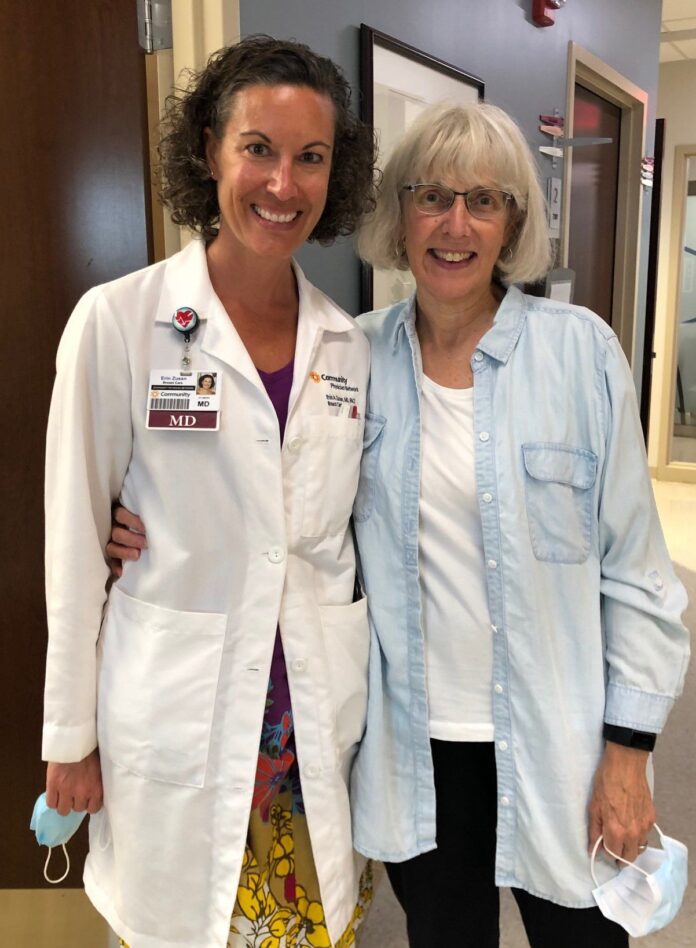
By Sharon Mangas
For the Republic
I SAT near my kitchen window mid-August 2016, gazing out at Sandy Hook Lake. I contemplated the bottle of pills on the tabletop. Pills I’d be taking for at least five years.
It had been two-and-a-half years since a routine mammogram unearthed an ‘area of concern’ on my right breast. Five months since the ‘area of concern’ was diagnosed as cancer. Three months since my lumpectomy and sentinel node biopsy. Two weeks since finishing radiation. I picked up the pill bottle, turning it in my hands. There could be side effects to the medication. It was powerful stuff. My prognosis was good, but cancer is cancer. Would I have a recurrence? Would I be around in five years to gulp down the last tablet? I said a short prayer, and in an act of medical communion, swallowed the first pill.
I was open about my diagnosis from the beginning, even posting about it on social media. The outpouring of love and support that I got from friends and family was an invaluable resource. I was especially touched by the breast cancer survivors who reached out when they heard about my diagnosis, sharing their stories and giving me hope. It’s not a club you are anxious to join, but we’re a circle of strong women from all walks of life.
Prior to former First Lady Betty Ford going public with her breast cancer diagnosis and mastectomy in 1974, most American women with breast cancer were reluctant to discuss it. While some women still prefer to keep their diagnoses private, I can’t imagine how tough it was for the many who suffered in silence.
Following surgery, I took my doctors’ advice: eat healthy, rest often, get plenty of exercise, and don’t read cancer horror stories on the internet. And remain vigilant with follow-up appointments and testing.
I tried some things during recovery that didn’t work for me. I took a Tai Chi exercise class after reading of its benefits. I decided Tai Chi wasn’t for me, but I got sage advice from a friend in the class who was a nurse and longtime Tai Chi afficionado. “Sharon, one day you’ll wake up and I promise you, cancer won’t be the first thing on your mind.” I wasn’t sure that would ever come to pass, but one day it did. I can’t say I never think about cancer, but as time passes, it isn’t in the forefront of my thoughts anymore. Yes, mammograms always put me on high alert, but so far, so good.
Brisk walking is my favorite exercise. Fresh air and a good walk always help me, physically and mentally.
What didn’t help after my diagnosis? Well-meaning people who gave unsolicited advice. “Don’t eat sugar! It causes cancer.” Or people who for whatever reason wanted to tell you dreadful stories about people they knew whose treatment failed. That doesn’t help. At all.
I learned to advocate for myself through my five-year recovery. When I experienced unpleasant side effects from my medication, I learned that some women got relief after switching to a particular generic brand of the drug. I found a pharmacy that would allow that brand and had almost immediate relief to my symptoms. Some women with my type of breast cancer give up on medication altogether due to side effects. When I hit a bump in the road during treatment, I didn’t give up.
My mother always took doctors’ advice without question. Today, doctors want you to take an interest in your health. When I did any online research, I only accessed information from reputable medical websites, like Mayo Clinic or Johns Hopkins, and stayed away — as my doctors recommended — from internet horror stories. Don’t take medical advice from Dr. Facebook.
Mid-August 2021. Five years and 1,825 pills later, I sit at my kitchen table, looking out at Sandy Hook Lake. Preparing to recycle what’s left of my medication. My medical oncologist gave me the welcome news I could stop taking it after five years. Cancer research has changed since I started taking the medication. Dosing protocols for some women have been extended to another two to five years. My oncologist said my risk was minimal, and I could give it up now.
I’ll stay vigilant and continue with recommended followups and testing. As someone who had none of the known risk factors for breast cancer, my diagnosis was a shock. But one in eight women will get breast cancer in their lifetimes, so I remain a big advocate for regular mammograms and annual physicals. Breast cancer is very treatable when found early.
Life is full of risks and challenges, and cancer is a big one. Some of us get reprieves from the disease, and some of us don’t. One quote (attributed to several sources) sums up my feelings five years out from my diagnosis: “It is not the years in your life, but the life in your years that counts.”
Life is fragile. No matter what the circumstances, look for moments of joy in every precious day.




